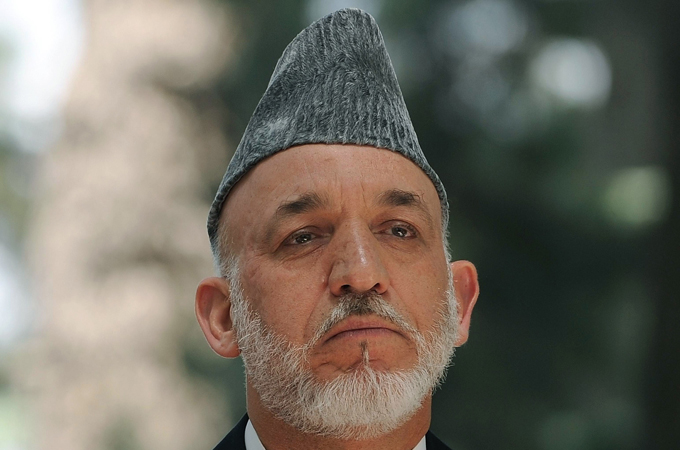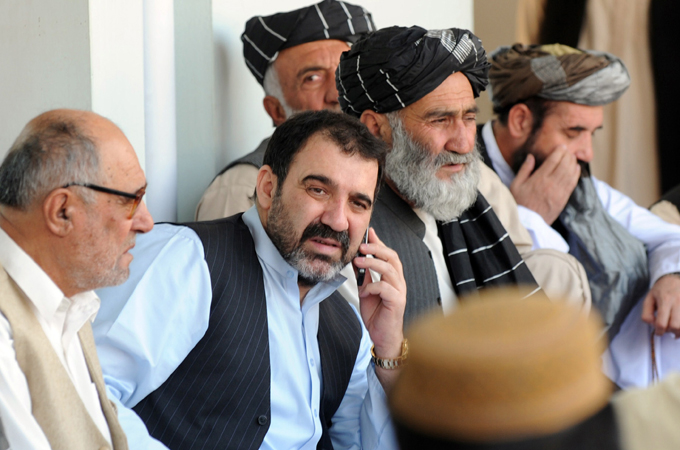Karzai’s brother shot dead in Kandahar
Afghan president’s half brother Ahmed Wali Karzai, who was accused of having criminal ties, shot by close associate.

Ahmed Wali Karzai, half brother to the Afghan president and one of the most powerful men in the country, has been killed in Kandahar city by a close associate, according to government officials and a member of his security team.
Wali Karzai, the head of the Kandahar provincial council, was shot dead on Tuesday morning inside his house by Sardar Mohammad, a “dear” friend who regularly visited him, according to the security source and a member of the provincial council.
A Taliban spokesman told Al Jazeera that they were behind the killing and had assigned Mohammad to carry it out a “long time” ago.
But Afghan analysts said the Taliban often claims credit for acts it may not have organised, and according to officials, Mohammad had been close to Wali Karzai for many years.
Wali Karzai was an important figure in the south. But his death “is not a sign of losing the fight in the south against the Taliban,” Waheed Omer, spokesman for President Hamid Karzai, told Al Jazeera.
“This was a case of assasination and it can happen anywhere. It does not signal any deterioration of security in the south,” Omer said.
Mohammad shot Wali Karzai in the stomach and chest as he emerged from a bathroom and was then shot and killed by other bodyguards, according to the security source.
Tight security
President Karzai arrived for the funeral in Kandahar under tight security, Omer confirmed to Al Jazeera.
“We know we live in a dangerous country. We know that security has to be tight all the time and the president knows [this]. He’s got good secuirty and that is not a worry for the president.”
Reports suggested Karzai’s elite security team, the Presidential Protective Service, had been deployed to secure the city for the funeral, that was postponed to tomorrow so family members could arrive.
“The president is upset, he is still in grief, about the death of his brother. Wali was a very close brother of the president,” Omer said.
Karzai betrayed little emotion as he confirmed his brother’s death at a scheduled press conference earlier on Tuesday afternoon.
“My younger brother was martyred in his house today. This is the life of all Afghan people, I hope these miseries which every Afghan family faces will one day end,” Karzai said.
‘Illiterate’ security commander
Mohammad was the commander of checkpoints in the Zakir Sharif area, where the Karzai family’s paternal hometown of Karz is located, around five kilometres south of Kandahar, Zalmay Ayoubi, a spokesman for the provincial governor told Al Jazeera.
 |
| Karzai’s father was assassinated in 1999 in Pakistan [AFP] |
Mohammad was about 35 years old, had 150 people under his command and was “totally illiterate,” Ayoubi said.
Some analysts speculated that the killing may have been the result of a personal dispute between the two men.
But Haji Ehsan, a member of the provincial council, said Mohammad was “very dear” to Wali Karzai and became a commander on his recommendaftion.
“This morning, they had spoken on the phone before [Mohammad] went to visit him,” Ehsan told Al Jazeera. “This can’t be a personal feud. They were too close. This is definitely a conspiracy against Ahmed Wali, it is difficult to say at this point by who.”
Wali Karzai’s death comes two weeks after an attack on the Inter-Continental Hotel in Kabul, which the Taliban said was their work. Nineteen people died in that assault.
It was the second major assassination in Kandahar province in three months: In April, a suicide bomber killed provincial police chief Khan Mohammad Mujahed.
In response to the assassination, police mobilised a massive response in Kandahar city, according to Kabul-based journalist Matthieu Aikins, who spoke to a resident.
Checkpoints were “locked down,” helicopters hovered overhead, and the road to the hospital, where Wali Karzai’s body was taken, was blocked off, Aikins wrote on Twitter.
‘Super governor’
Wali Karzai was considered a Popalzai tribal elder, but his power extended far wider in Afghan business, politics and security. He has been described in various media reports as a “warlord” involved in drug smuggling and as a paid asset of the Central Intelligence Agency.
“He was effectively the super governor of southern Afghanistan,” said Al Jazeera’s James Bays, who met Wali Karzai on multiple occasions and has reported extensively from the country.
In fact, influential pro-government Kandaharis had lobbied the president as recently as June to appoint Wali Karzai governor of the province, a prospect which seemed close to becoming a reality, Aikins wrote in Harper’s magazine.
The current governor, Tooryalai Wesa, spent the majority of the past two decades in Canada and was considered far less influential than the head of his provincial council.
Call for unity
Amrullah Saleh, the former Afghan intelligence chief, said the government should use Wali Karzai’s killing to come together against common enemies: al-Qaeda, the Taliban and Pakistani armed groups.
 |
| Wali Karzai’s influence far outpaced his official title [AFP] |
“Ahmed Wali Karzai was standing against these forces,” he said. “This has boosted the morale of our enemies and given them more opportunities to infiltrate our ranks.”
US General David Petraeus condemned the killing in a statement and said NATO forces would help the Afghan government try to bring to justice those involved in Wali Karzai’s killing.
“President Karzai is working to create a stronger, more secure Afghanistan, and for such a tragic event to happen to someone within his own family is unfathomable,” the statement said.
There had been several previous attempts on Wali Karzai’s life, and even the United States once warned that they could kill him.
In May 2009, Wali Karzai said he had been ambushed on the road to Kabul by Taliban fighters, who killed one of his bodyguards. Six months earlier, he happened to be away when a Taliban attack on government buildings in Kandahar left six people dead.
In March 2010, a senior US military official told the Reuters news agency that Wali Karzai could be targeted for killing or capture if it were ever proved that he provided arms or assistance to insurgent groups.
“We’d rather not have a guy like that down there because he’s so divisive,” the official said. “But there’s nothing that we can do unless we can link him to the insurgency.”
Allegations of CIA payments
Rumours of Wali Karzai’s involvement in Afghanistan’s opium trade have circulated for years. Wali Karzai once personally ordered a local commander in the security forces to release a large truck carrying heroin, the New York Times reported in 2007.
He repeatedly denied any role in the drug trade and said he was the “victim of politics”.
Confronted once in 2009 by a McClatchy news agency reporter who had interviewed officials and elders implicating him in drug trafficking, Wali Karzai threatened to beat the reporter and ordered him to leave his house.
Though many in the US government and outside analysts considered Wali Karzai’s pervasive influence in Kandahar and the surrounding provinces an obstacle to the stated goal of improving Afghanistan’s governance, it also seemed difficult if not impossible to work against him.
After General Petraeus, who is set to become the next CIA director, took command of NATO forces in Afghanistan in mid-2010, the West’s approach to Wali Karzai seemed to shift. NATO officials said their plan was to work with him, especially as their military efforts increasingly focused on Kandahar.
But clandestine cooperation with Wali Karzai likely began far earlier: The New York Times reported in 2009 that Wali Karzai had been receiving regular payments from the CIA for the previous eight years, in part to fund an Afghan paramilitary force that operated at the CIA’s direction.
Wali Karzai was paid to allow the so-called Kandahar Strike Force to use a large compound outside the city, and a senior US official referred to him as “our landlord”.
Mujib Mashal contributed reporting.